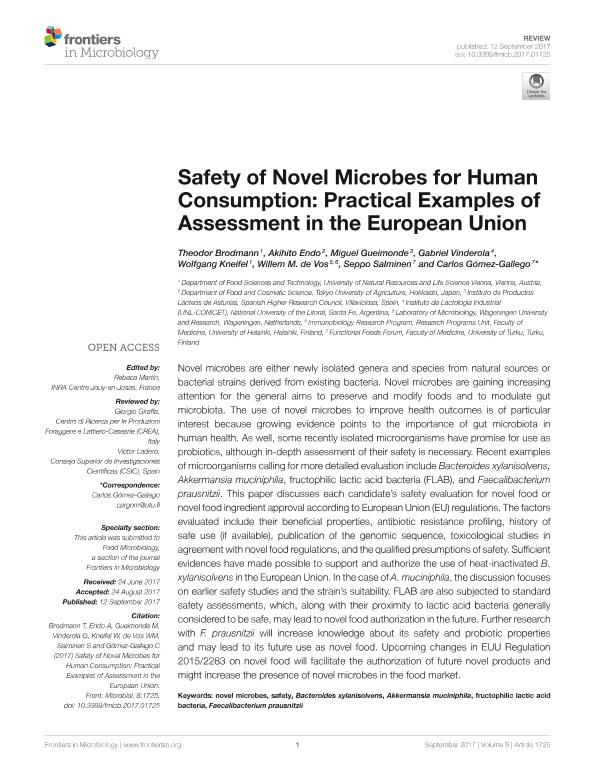Mostrar el registro sencillo del ítem
dc.contributor.author
Brodmann, Theodor
dc.contributor.author
Endo, Akihito
dc.contributor.author
Gueimonde, Miguel
dc.contributor.author
Vinderola, Celso Gabriel

dc.contributor.author
Kneifel, Wolfgang
dc.contributor.author
de Vos, Willem M.
dc.contributor.author
Salminen, Seppo
dc.contributor.author
Gómez-Gallego, Carlos
dc.date.available
2018-09-18T13:37:42Z
dc.date.issued
2017-09
dc.identifier.citation
Brodmann, Theodor; Endo, Akihito; Gueimonde, Miguel; Vinderola, Celso Gabriel; Kneifel, Wolfgang; et al.; Safety of novel microbes for human consumption: Practical examples of assessment in the European Union; Frontiers Media S.A.; Frontiers in Microbiology; 8; 9-2017; 1-15
dc.identifier.issn
1664-302X
dc.identifier.uri
http://hdl.handle.net/11336/60055
dc.description.abstract
Novel microbes are either newly isolated genera and species from natural sources or bacterial strains derived from existing bacteria. Novel microbes are gaining increasing attention for the general aims to preserve and modify foods and to modulate gut microbiota. The use of novel microbes to improve health outcomes is of particular interest because growing evidence points to the importance of gut microbiota in human health. As well, some recently isolated microorganisms have promise for use as probiotics, although in-depth assessment of their safety is necessary. Recent examples of microorganisms calling for more detailed evaluation include Bacteroides xylanisolvens, Akkermansia muciniphila, fructophilic lactic acid bacteria (FLAB), and Faecalibacterium prausnitzii. This paper discusses each candidate's safety evaluation for novel food or novel food ingredient approval according to European Union (EU) regulations. The factors evaluated include their beneficial properties, antibiotic resistance profiling, history of safe use (if available), publication of the genomic sequence, toxicological studies in agreement with novel food regulations, and the qualified presumptions of safety. Sufficient evidences have made possible to support and authorize the use of heat-inactivated B. xylanisolvens in the European Union. In the case of A. muciniphila, the discussion focuses on earlier safety studies and the strain's suitability. FLAB are also subjected to standard safety assessments, which, along with their proximity to lactic acid bacteria generally considered to be safe, may lead to novel food authorization in the future. Further research with F. prausnitzii will increase knowledge about its safety and probiotic properties and may lead to its future use as novel food. Upcoming changes in EUU Regulation 2015/2283 on novel food will facilitate the authorization of future novel products and might increase the presence of novel microbes in the food market.
dc.format
application/pdf
dc.language.iso
eng
dc.publisher
Frontiers Media S.A.
dc.rights
info:eu-repo/semantics/openAccess
dc.rights.uri
https://creativecommons.org/licenses/by-nc-sa/2.5/ar/
dc.subject
Akkermansia Muciniphila
dc.subject
Bacteroides Xylanisolvens
dc.subject
Fructophilic Lactic Acid Bacteria, Faecalibacterium Prausnitzii
dc.subject
Novel Microbes
dc.subject
Safety
dc.subject.classification
Otras Ciencias Biológicas

dc.subject.classification
Ciencias Biológicas

dc.subject.classification
CIENCIAS NATURALES Y EXACTAS

dc.title
Safety of novel microbes for human consumption: Practical examples of assessment in the European Union
dc.type
info:eu-repo/semantics/article
dc.type
info:ar-repo/semantics/artículo
dc.type
info:eu-repo/semantics/publishedVersion
dc.date.updated
2018-09-14T14:26:47Z
dc.journal.volume
8
dc.journal.pagination
1-15
dc.journal.pais
Suiza

dc.description.fil
Fil: Brodmann, Theodor. University Of Natural Resources And Life Science Vienna; Austria
dc.description.fil
Fil: Endo, Akihito. Tokyo University Of Agriculture; Japón
dc.description.fil
Fil: Gueimonde, Miguel. Consejo Superior de Investigaciones Científicas. Instituto Superior de Productos Lacteos de Asturias; España
dc.description.fil
Fil: Vinderola, Celso Gabriel. Consejo Nacional de Investigaciones Científicas y Técnicas. Centro Científico Tecnológico Conicet - Santa Fe. Instituto de Lactología Industrial. Universidad Nacional del Litoral. Facultad de Ingeniería Química. Instituto de Lactología Industrial; Argentina
dc.description.fil
Fil: Kneifel, Wolfgang. Wageningen University And Research; Países Bajos
dc.description.fil
Fil: de Vos, Willem M.. Wageningen University And Research Centre; . University Of Helsinki Faculty Of Medicine;
dc.description.fil
Fil: Salminen, Seppo. University of Turku; Finlandia
dc.description.fil
Fil: Gómez-Gallego, Carlos. University of Turku; Finlandia
dc.journal.title
Frontiers in Microbiology
dc.relation.alternativeid
info:eu-repo/semantics/altIdentifier/url/http://journal.frontiersin.org/article/10.3389/fmicb.2017.01725/full
dc.relation.alternativeid
info:eu-repo/semantics/altIdentifier/doi/http://dx.doi.org/10.3389/fmicb.2017.01725
Archivos asociados
